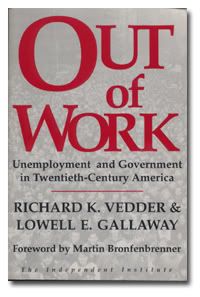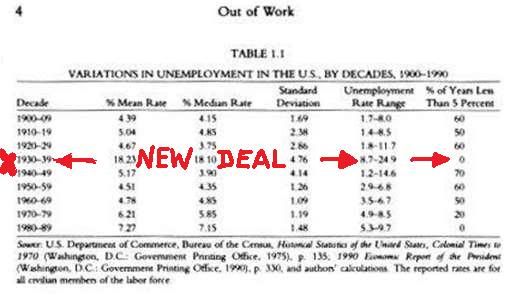"Sometimes you can read a book that will change your mind on some fundamental issue. Rarely, however, is there just one page that can undermine or destroy a widely held belief. But there is such a page — page 77 of the book Out of Work, by Richard Vedder and Lowell Gallaway.
The widespread belief is that government intervention is the key to getting the country out of a serious economic downturn. The example often cited is Pres. Franklin D. Roosevelt’s intervention after the stock-market crash of 1929 was followed by the Great Depression of the 1930s, with its massive and long-lasting unemployment.
This is more than just a question about history. Right here and right now, there is a widespread belief that the unregulated market is what got us into our present economic predicament, and that the government must “do something” to get the economy moving again. FDR’s intervention in the 1930s has often been cited by those who think this way.
What is on that one page in Out of Work that could change people’s minds? Just a simple table, giving unemployment rates for every month during the entire decade of the 1930s.
Those who think that the stock-market crash in October 1929 is what caused the huge unemployment rates of the 1930s will have a hard time reconciling that belief with the data in that table.
Although the big stock-market crash occurred in October 1929, unemployment never reached double digits in any of the 12 months after that crash. Unemployment peaked at 9 percent, two months after the stock market crashed — and then began drifting generally downward over the next six months, falling to 6.3 percent by June 1930.
This was what happened in the market, before the federal government decided to “do something.”

"What the government decided to do in June 1930 — against the advice of literally a thousand economists, who took out newspaper ads warning against it — was impose higher tariffs, in order to save American jobs by reducing imported goods.
This was the first massive federal intervention to rescue the economy, under Pres. Herbert Hoover, who took pride in being the first president of the United States to intervene to try to get the economy out of an economic downturn.
Within six months after this government intervention, unemployment shot up into double digits — and stayed in double digits in every month throughout the entire remainder of the 1930s, as the Roosevelt administration expanded federal intervention far beyond what Hoover had started.
...
If more government regulation of business is the magic answer that so many seem to think it is, the whole history of the 1930s should have been different. An economic study in 2004 concluded that New Deal policies prolonged the Great Depression. But the same story can be found on one page in Out of Work.
While the market produced a peak unemployment rate of 9 percent — briefly — after the stock-market crash of 1929, unemployment shot up after massive federal interventions in the economy. It rose above 20 percent in 1932 and stayed above 20 percent for 23 consecutive months, beginning in the Hoover administration and continuing during the Roosevelt administration.
The very fact that we still remember the stock market crash of 1929 is remarkable, since there was a similar stock-market crash in 1987 that most people have long since forgotten.
What was the difference between these two stock-market crashes? The 1929 stock-market crash was followed by the most catastrophic depression in American history, with as many as one-fourth of all American workers being unemployed. The 1987 stock-market crash was followed by two decades of economic growth with low unemployment.
But that was only one difference. The other big difference was that the Reagan administration did not intervene in the economy after the 1987 stock-market crash — despite many outcries in the media that the government should “do something.”"
— Thomas Sowell is a senior fellow at the Hoover Institution. © 2010 Creators Syndicate, Inc.
I have unfortunately been unable to retrieve the notorious graph on page 77 of Vedder and Lowell's book. I have however found a similar one which tells basically the same story. The numbers stare you in the face:

Note that the mean unemployment percentage and the median unemployment percentage are practically equal, 18.23 vs 18.10. This means that there are few extreme values in between the "lowest" percentage, 8.7% (!) and the highest, 24.9%. (yeah, that's twenty-four point nine per cent unemployment). Bottom line: pretty constant misery and no matter how much the FDR administration tried to "create" or "save" jobs in this lost decade, it had no influence at all. The only "influence" it had was the dull pain caused by the intrinsically wrong premisse - that the State can create jobs. A state can, apart from the working places with which it necessarily has to fill its administrations, not create jobs. And the number of those working places should be modest. Dick Armey did some useful research regarding the maximum desirable size of government. Yet what FDR was determined to do was the same as what the current occupant of the White House does (or wants us to believe to): "create jobs". In the 1930's, Roosevelt basically extended the brief 1929-1930 recession to a full blown depression lasting a decade. And his "famous" New Deal... actually destroyed the lives of tens of millions of ordinary Americans.
It should of course be noted that it was actually Hoover, a Republican, who gave the opening shots in this dismal adventure. Of course, FDR took it a step further, or rather, a whole flight of steps. But Hoover's decision to impose higher tariffs through the notorious Smoot-Hawley Tariff Act, a typically leftist mechanism, reminds us that long before George W. Bush and Paulson tried a leftist method (their 2008 168 billion$ "mini stimulus" package, which achieved nothing), other rightwing presidents made the mistake of picking a recipe from the leftist cookbook.
They shouldn't.
Never.
I shudder at the thought that people in positions FAR HIGHER than mine in life, indeed, a person supposed to be the mightiest man in the world, fails to learn simple lessons from history. And that he gets away with it. More, that he is actively supported in his devastating schemes by people who should know better.
MFBB.
No comments:
Post a Comment